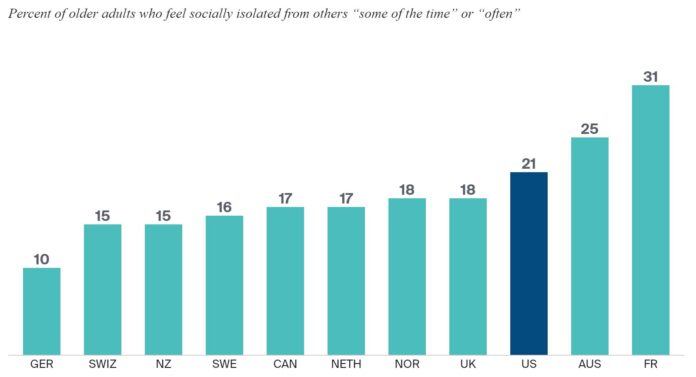Social isolation is certainly not just an American phenomenon. A 2017 Commonwealth Fund study of 11 high-income countries showed that between 10 percent and 30 percent of adults 65 and older report feeling isolated from others. Several countries have implemented programs to address the problem, especially for elderly people and those with underlying health conditions — the same populations with the highest risk of developing severe cases of COVID-19.
Strategies from European Countries
Mobilizing Volunteers. Several countries have organized volunteer telephone support services to help connect with older adults. In Ireland, Friends of the Elderly schedules regular phone calls between older adults and trained part-time volunteers. A similar program in Canada, called Friendly Phone Program, is organized by the local Red Cross. It matches seniors with volunteers who call for weekly check-ins.
Digital Solutions. A Norwegian company, No Isolation, developed a “one-button computer” designed to help people with no experience using smartphones or computers. With an internet connection and a power outlet, it can stream photos, send or receive messages, and conduct video calls. Currently the product is available in eight European countries.
Primary Care Models. A third strategy builds on existing primary care models that can be adapted to use remote communication to maintain social connections. As part of the Proactive Primary Care Approach for the Frail Elderly (U-PROFIT) in the Netherlands, nurses assess patients’ health and social needs or issues, including loneliness, using a structured questionnaire. If patients screen positive for loneliness, a nurse follows an evidence-based protocol, which can include building a social district team involving informal caregivers and community volunteers to work with the patient and primary care practitioners to increase social interactions.
National Leadership. The United Kingdom has made reducing loneliness a national priority. In 2016, Parliament established a nongovernmental Commission on Loneliness to study the problem and make recommendations. The Commission published its report in 2017, and both the Labour and Conservative parties used its insights to inform their policies.
ANALYSIS:
I found this particular article to be eye-opening. Escpcially the connection made with how countries that have a higher issue with feeling lonely also are higher in COVID cases. While reading this article, I also found myself asking the question “how does one measure loneliness”? I found the Netherlands’ proactive approach to be fascinating and how they screen for loneliness. The Netherlands seems to once again be highly socially aware in its approaches to overall mental health. The aspect of being socially lonely requires one to be self-aware of the symptoms and having an approach where you’re asking the right questions to assess these symptoms is certainly one way of bringing the issue to one’s attention. A commonality amongst many of these solutions is creating social interactiveness through physical social connection.
Abrams, Melinda K, et al. “Solutions from around the World: Tackling Loneliness and Social Isolation during COVID-19.” Commonwealth Fund, https://www.commonwealthfund.org/blog/2020/solutions-around-world-tackling-loneliness-and-social-isolation-during-covid-19.




